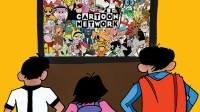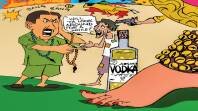When we talk about media, the first thing we get in our mind is Television. Television no doubt is the largest source of media but Radio, Internet, Newspaper also comes in it. Media has captured people’s attention and people are mesmerized by it. We sit in front of the television and yet little do we know how much these programs are damaging our minds. The violence, crime, nudity and sexual contents displayed on TV are like slow poison that starts affecting the mind slowly and gradually. The false messages that media violence sends are very damaging.
TV media is really very famous in Pakistan especially the Indian TV programs. They have captured the whole of Pakistan, whether it is a small child or an adult, everybody is really involved in their plays. As soon as it is night time and the time for the plays start, people switch on the television and the whole family sits glued to their TV sets. Once the plays start they watch it without blink of an eye. They become involved in the play. Once the play ends they discuss it and wonder what the next turn is going to be. These plays leave an imprint on their minds and their behavior and gestures also sometimes become like the actors in the play.
I agree that watching TV is a good past time and entertaining but we should just watch them and then forget about them after watching. Remember, these are all work of fiction and they do not have anything real in them. The dresses they wear, the language they use and also the story is not worth watching with the whole family. The dresses encourage nudity, while the story encourages corruption and violence. Every woman in the play is plotting against their own family, trying to destroy them. The story in all the plays is violence, corruption and plotting against each other.
People watch these plays and do not even realize that the messages hidden underneath them have a very strong impact upon their mind, as they subconsciously associate themselves with the characters of the play. This is because the TV media is unconsciously programming their innocent mind.
Leave aside adults lets come on to children now and see what affect it has on them psychologically. Let me quote a few examples of children severely affected by TV. A young boy aged 6 was coming to me for therapy. He used to watch a lot Television and thought all these cartoons like Dexter Laboratory, Superman and Batman were real. When someone asked him what he wanted to become when he grows up, he said he wanted to become Dexter. This child only talked about Dexter. He had even several times tried of doing experiments at home but in vain. The mother was sick of this, as this was affecting his studies. He even dreamt of Dexter and said that Dexter came in his dream quite often.
Let me quote the example of another one. A small girl 5 years of age had a lot of hallucinations (visions of some source or entity being present). Whenever she slept or she was playing she used to shout and scream and tell her mother that she saw someone and that someone came to her and tried to strangle her and beat her up. She even narrated the images of these strange entities. Her mother used to say that this is just in your mind forgets about it. Well things kept on going like this for the little child and with passage of time these fits or episodes increased. It was at this time that the mother realized that she ought to do something about it. She brought the child for therapy. The child was very intelligent and imaginative. I came to know that the mother made her watch all these horror plays and movies and the child associated them with herself. Her mind was innocent and as she watched a lot of these plays and spent most of her time in front of the television watching T.V, these programs left traces in her mind and she started having hallucinations and nightmares. The child used to tell her mother that she doesn’t want to watch them but the mother was a working woman and as she had less time on her disposal she told her child to go and watch Television. Little did she know that she would have to pay the price in this way?
How do most children and young people react to media violence?
Most people, of course, don’t become violent when they watch TV or movie violence. But they may be affected in other ways. These can be:
1. An aggressor effect--encouraging violent behavior. When a fight scene comes a person gets thrilled and the subconscious desire of violence or aggression is built to build in aggression.
2. A victim effect--increasing fearfulness. Sometimes a person gets scared and this fear is again in the subconscious mind.
3. A bystander effect--leading to cruelty, accepting violence as normal. When media portrays violence, viciousness, etc, people accept it as a part of daily routine.
4. An appetite effect--building a desire to watch more violence. Again it provides thrill as mentioned earlier and people have a desire to watch it again and again.
Which young people are most susceptible to influence by media violence?
1. Identifying with the general characters. The response, therefore, depends on which character the viewer identifies with. Since aggressors in the media are usually male and females are usually victims, forexample, boys are more likely to respond with aggression and girls with fear, as boys are more violent and girls submissive.
2. Interpretation is done keeping in mind one’s own situation and circumstances in real life. Media violence is more likely to have a strong effect, therefore, on children who see violence in their lives. It also has astronger effect on young children, who lack the real-life experience to judge whether something they see is realistic. They do not have an idea about the real life so they think that all that is showed on TV isreal.
3. Personal fantasizing about the characters on a violent show. Daydream “reruns” increase the influence of scenes a child has watched.
Now, we come up to the remedies of all the above mentioned.
Talk about what you see on TV, as discussion about TV programs and views helps to read the mind of the other person.
Limit watching time to no more than 20-25 hours per week. Like this a routine will be set and their minds will not be so affected.
With young children, watch TV with them and talk to them about how the characters feel other endings that they can create. Like this the child will know about the right and wrong.
Screen the programs for children. For instance young girls who watch a lot of channel V have started dressing up like them. If we put parental lock on that channel and tell the children about the good and bad they will be able to confide within the rules and regulations of the society they live in.
Encourage your children to watch educational programs.
The writer is a Psychologist, Hypnotherapist & Reiki Healer in Lahore. She is also a member of Punjab assembly.






















